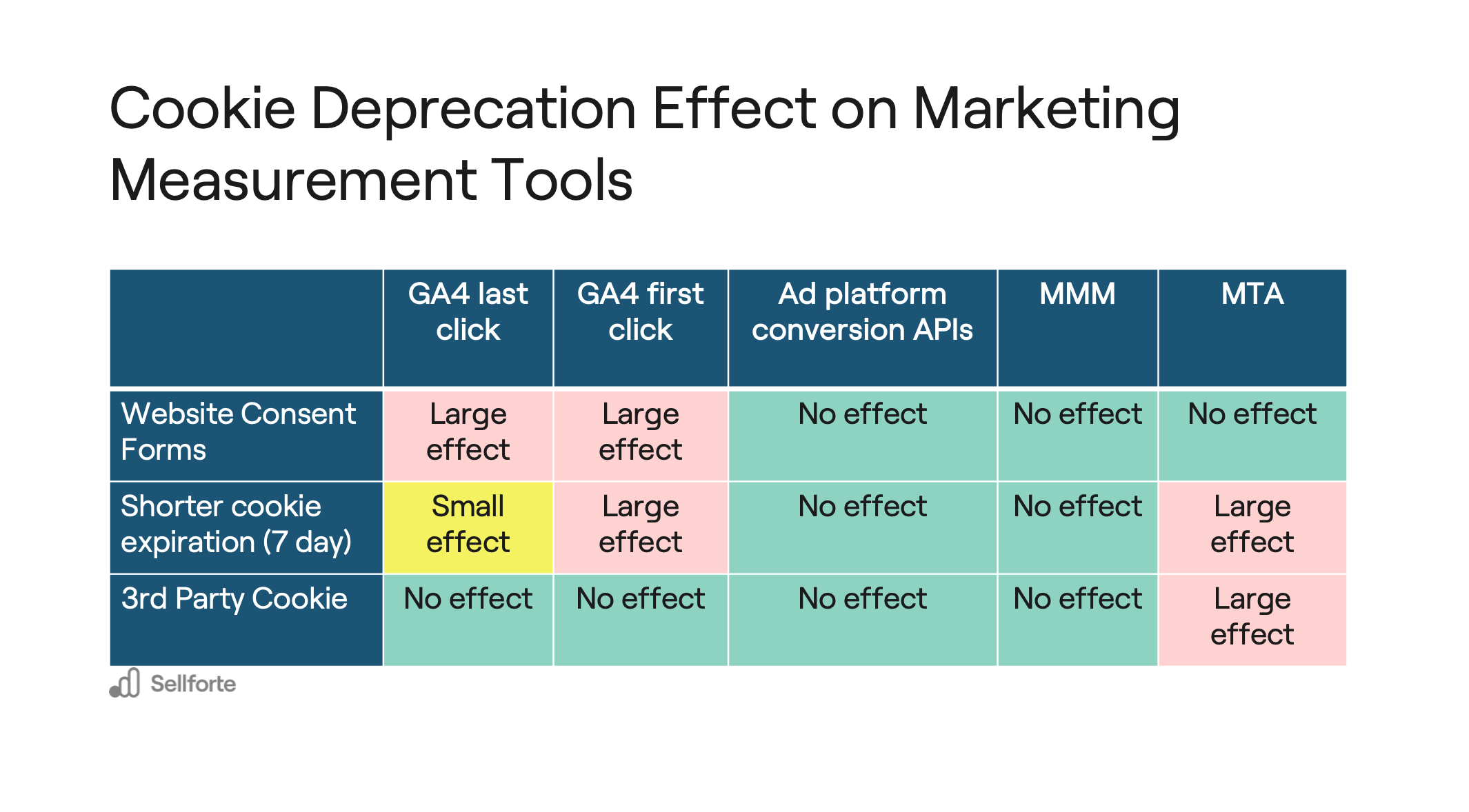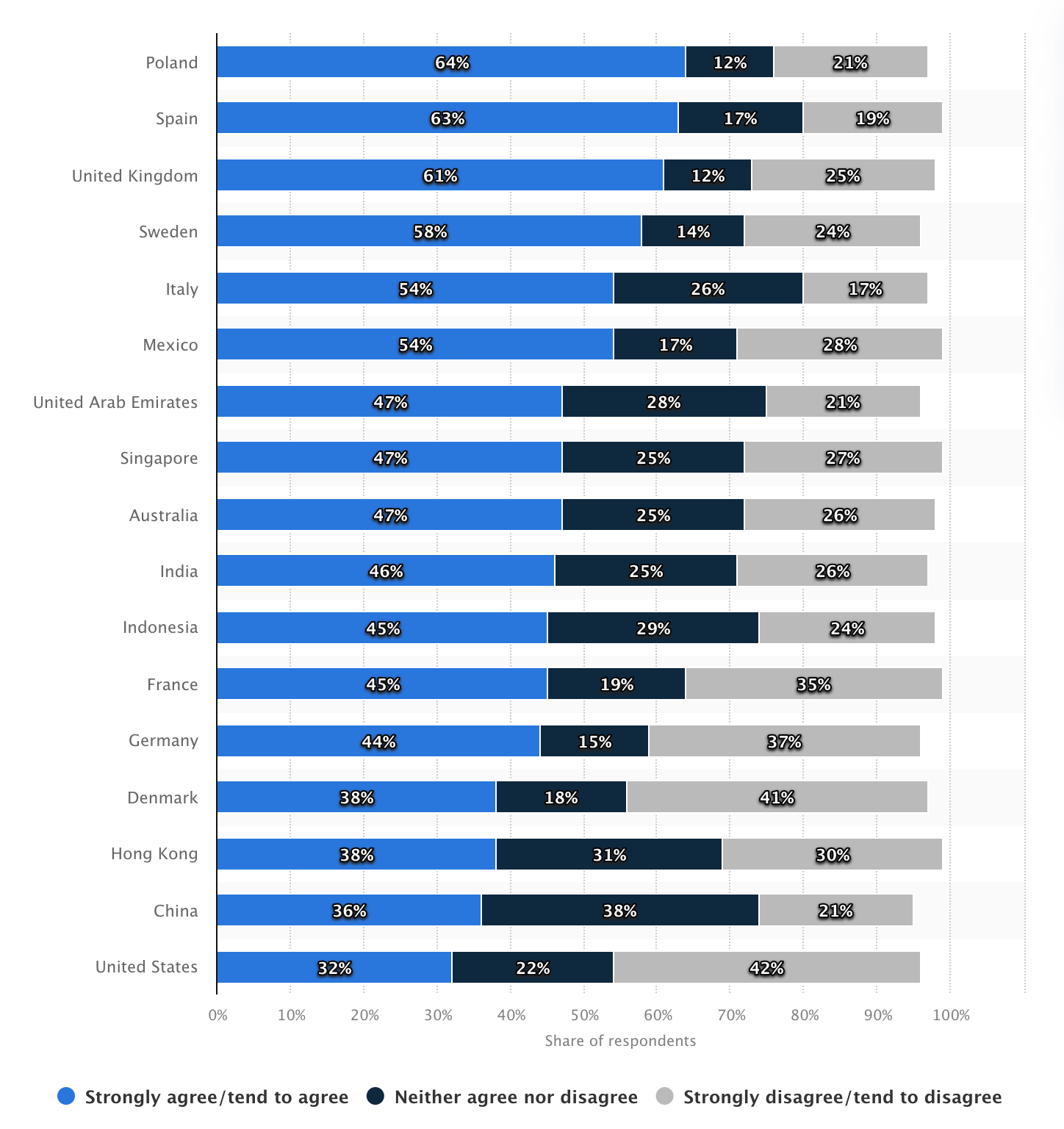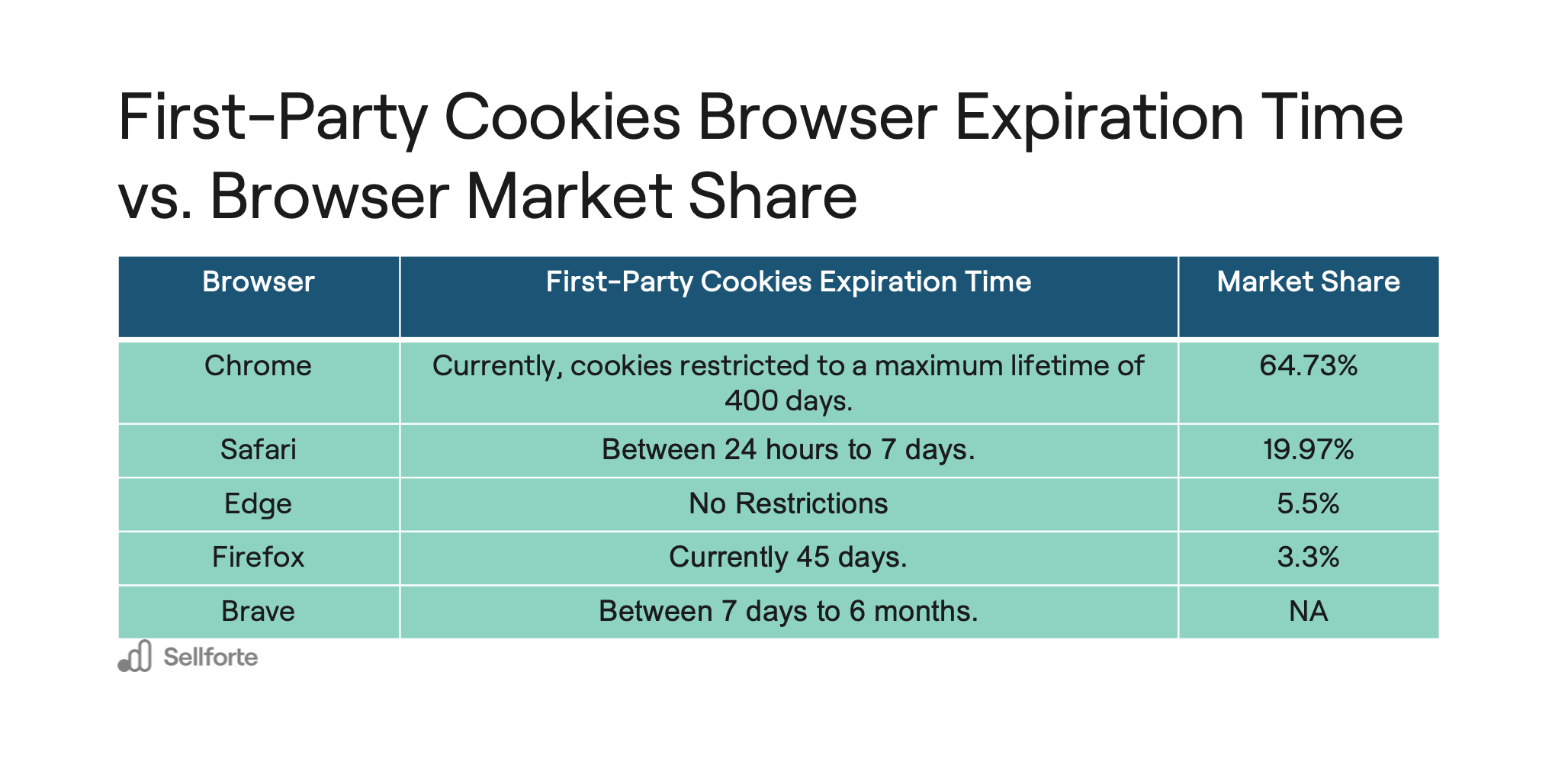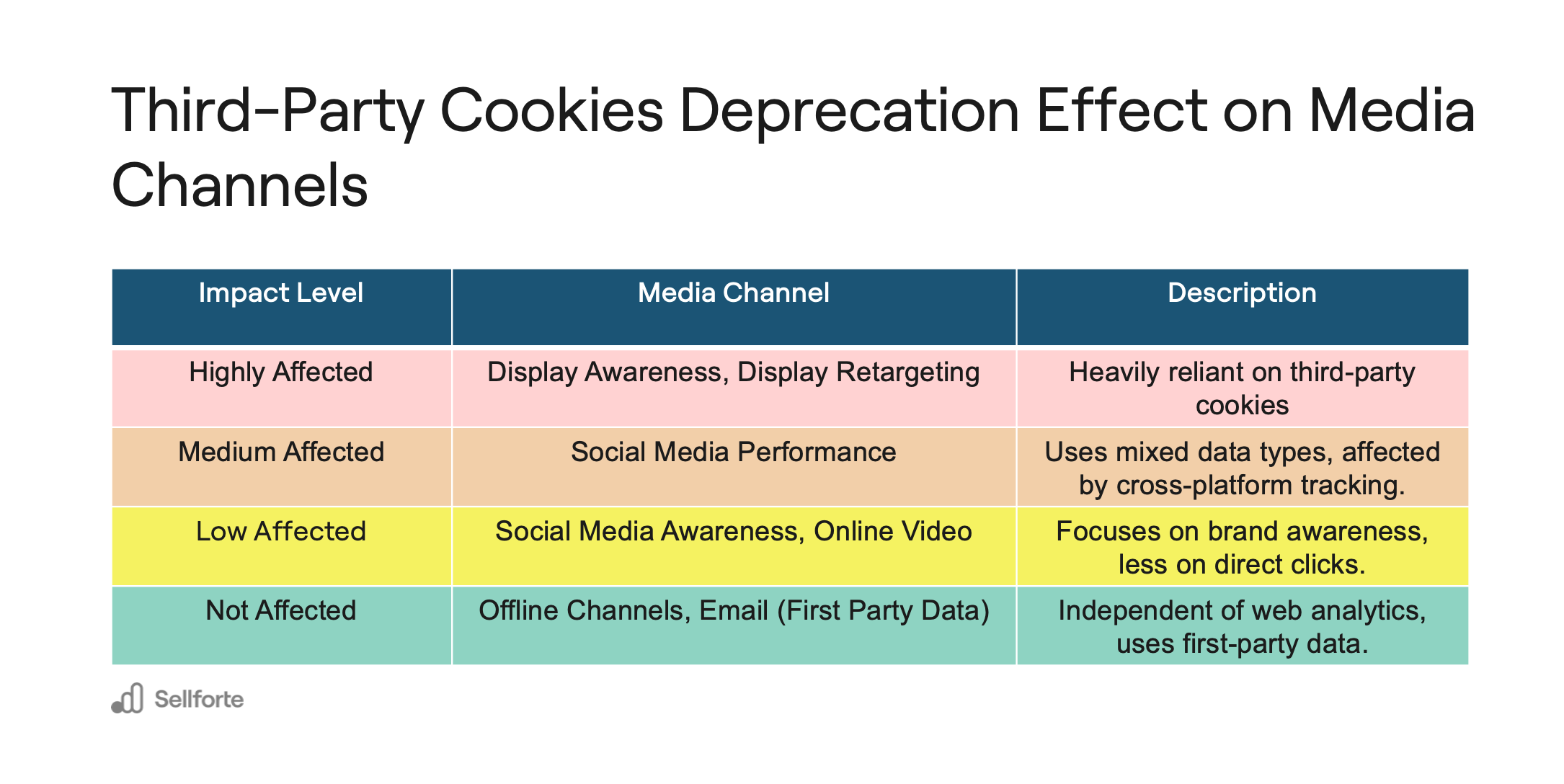Blog
What impact will the loss of cookies have on my business?
January 31, 2024 | Juha Nuutinen, Paul Arpikari, Carmen Bozga

Google's decision to phase out third-party cookies from its Chrome browser in 2024 marks a significant shift in the digital landscape. This change is primarily driven by growing concerns around privacy and data protection. Third-party cookies, which have been instrumental in tracking user behavior across the web for targeted advertising, are increasingly viewed as intrusive by users and regulators alike.
The disappearance of these third-party cookies from Google Chrome, which holds a substantial share of the browser market, signifies a move towards more privacy-centric web browsing. This transition will have a profound impact on advertisers, publishers, and businesses reliant on cookie-based tracking for targeted marketing and audience insights.
As the industry adapts, there's a growing focus on alternative technologies and strategies for audience targeting and measurement. This includes reliance on first-party data, contextual advertising, and new privacy-preserving methods. These changes underscore a broader trend towards prioritizing user privacy and consent in the marketing measurement digital ecosystem.
At the first glance, the visible consequences for the depreciation of third-party cookies are:
- Reduced Tracking Accuracy: Without third-party cookies, tracking users across different websites becomes more challenging. This impacts the accuracy of cross-site user behavior analysis.
- Shift to First-Party Data: Marketers will increasingly rely on first-party data gathered directly from their own platforms. This necessitates more engagement strategies to collect such data.
- Increased Emphasis on Contextual Advertising: With user-specific tracking limited, contextual advertising based on the content of the webpage will gain prominence.
- Privacy-First Alternatives: Adoption of new technologies like Google's Privacy Sandbox, which aims to provide privacy-preserving alternatives to cookies.
- Greater Focus on User Privacy: Marketing strategies will need to align with enhanced user privacy expectations, possibly leading to more transparent and consent-based approaches.
However, we believe that the changes brought by the disappearance of third-party cookies is not the only problems with cookies and we’ve listed those here below:
Website Consent Forms
The digital marketing landscape is undergoing significant transformation, primarily driven by enhanced privacy regulations and changing user behaviors. A key aspect of this shift is the introduction of website consent forms, mandated by privacy laws such as the General Data Protection Regulation (GDPR) in Europe and the California Consumer Privacy Act (CCPA) in the United States.
These regulations have a profound impact on web analytics tools, including Google Analytics 4 (GA4). GA4's ability to track and analyze user interactions on websites is now directly tied to users granting explicit consent for analytics cookies. This requirement has led to a scenario where GA4 captures a smaller portion of e-commerce revenue, with estimates suggesting that only 50-80% of transactions are tracked. This gap in data collection presents a challenge for marketers, as they no longer have a complete view of user behavior and revenue streams.
As the chart below shows, countries like Poland showed higher acceptance rates (64%) in 2021, contrasting with lower rates in the US (32%) and China (36%). Most countries have an acceptance rate below 50%, posing challenges for advertisers and retailers. The varied acceptance rates across different regions highlight the need for tailored consent strategies to effectively navigate these changes.
The variations across the cookie acceptance rates are crucial because they directly impact the effectiveness of digital marketing strategies that rely on cookies for user tracking and personalized advertising. In countries with lower acceptance rates, advertisers and retailers face challenges in gathering accurate user data, hindering their ability to target and retarget ads effectively. This necessitates the development of tailored consent strategies, taking into account regional differences in privacy attitudes and regulations. Adapting to these variations is essential for maintaining effective and compliant digital marketing practices globally.

Cookie Expiration Time
The implementation of shorter cookie expiration times, such as the 7-day limit, significantly affects first-touch attribution in web analytics tools like Google Analytics (GA) and Google Analytics 4 (GA4). This change is especially relevant when comparing different platforms like Desktop, Android, and Apple devices.
Due to these platforms' varied approaches to handling cookies and privacy, the impact on web analytics can differ substantially. In the case of Android users, for instance, you're more likely to get reliable first-touch tracking data compared to Apple devices, where stricter privacy measures like Intelligent Tracking Prevention (ITP) can lead to shorter cookie lifespans. This discrepancy highlights the need for marketers to adapt their tracking strategies and attribution models to account for these differences across platforms.

As you can see, Chrome, the most used browser globally, offers the longest cookies expiration time. Once the Chrome cookies will depreciate there will be a wave of challenges across digital marketing measurement technologies.
The shorter cookie expiration date impacts digital marketing measurement in several ways:
- Attribution Challenges: Shorter lifespans of cookies make it difficult to accurately track customer journeys over a longer period. This impacts attribution models, particularly those reliant on long-term user behavior.
- Reduced Data Accuracy: With less time to collect data, the accuracy and comprehensiveness of user behavior insights are reduced, affecting campaign analysis and optimization.
- Emphasis on First-Party Data: Marketers may shift focus towards first-party data collection strategies to bypass reliance on third-party cookies.
- Adaptation of Marketing Strategies: Shorter cookie durations require marketers to adapt strategies quickly based on a narrower window of user data.
- Increased Importance of Consent Management: Ensuring user consent for cookie tracking becomes more crucial as each interaction window shortens.
These changes necessitate a more agile and privacy-focused approach to digital marketing.
Deprecation of 3rd party cookies from main browsers
The deprecation of third-party cookies from major browsers significantly impacts multi-touch attribution (MTA) technologies used by online advertisers. This change predominantly affects companies heavily reliant on display advertising outside of the Google and Facebook ecosystems. Unlike clicked ads, display ads often rely on third-party cookies for tracking without requiring user interaction. However, ads that are clicked and tracked in GA4, provided the user consents, will not be as affected. This indicates that the impact is more pronounced for advertisers who utilized MTA to attribute a higher amount of sales to top-of-funnel or awareness channels. The deprecation alters how advertisers track and attribute user interactions across different marketing channels.
This change primarily affects advertisers who relied heavily on third-party data for understanding and influencing the broader customer journey, particularly in awareness and consideration stages.
Potential impacts are:
- Reduced Visibility in Customer Journey: Advertisers using display ads outside Google and Facebook will lose visibility into how these ads influence customer behavior, as tracking without direct clicks relies heavily on third-party cookies.
- MTA Limitations: Multi-touch attribution models will face challenges in accurately distributing credit for sales or conversions across different touchpoints, particularly in top-of-funnel activities.
- Click-based Tracking Remains Viable: Ads that are clicked and lead to consent-given interactions on a website will still be trackable in tools like GA4. This means conversion attribution for such ads is less affected.
- Targeting and Retargeting Changes: Advertisers will need to rethink targeting strategies, especially for retargeting campaigns that traditionally depend on third-party cookie data to track users across the web.
- Shift to Alternative Strategies: There's likely to be an increased focus on first-party data collection, contextual advertising, and the development of new tracking technologies that comply with privacy regulations.
- Ad Spend Reallocation: Companies might redirect their advertising budgets, emphasizing platforms where tracking and attribution are more straightforward.
Which one of these changes affect what?
So, who is affected by the new third-party cookies changes and in which way? We created a table for you.

Multi-touch Attribution (MTA): Significantly affected. The ability to track user interactions across various platforms and touchpoints is impaired by privacy restrictions and the deprecation of third-party cookies.
Web Analytics (GA4 last click, GA4 first click): Changes like cookie deprecation and increased privacy regulations impact the collection of comprehensive user data.
Ad Platform Attribution (e.g., Meta Pixel, TikTok Pixel): Not significantly affected. These platforms primarily use first-party data within their ecosystems, which are less impacted by third-party cookie restrictions.
Ad platform conversion APIs: They are not significantly affected because these APIs primarily rely on first-party data. This data is collected directly from user interactions with the advertiser's website or app, thus being less dependent on cross-site tracking.
Impact on Media Channels
The third-party cookie policy changes have particularly affected media channels dependent on third-party cookies, such as display awareness and retargeting, necessitating new strategic approaches. This high impact on certain channels stems from their reliance on third-party data for targeted advertising and measuring campaign effectiveness.
Meanwhile, social media performance channels are experiencing a medium level of impact. This is due to their reliance on a combination of first and third-party data, which presents challenges in cross-platform tracking. This situation has prompted a need for revised strategies in how social media performance is measured and optimized.
In contrast, channels like social media awareness and online video, which focus more on brand visibility rather than direct interaction, are less affected. Similarly, offline channels and email marketing, which primarily utilize first-party data and non-digital tracking methods, remain mostly unaffected. This diverse impact across channels highlights the importance for advertisers, particularly those with a significant online presence, to adapt and innovate in response to the evolving digital landscape.
The table below offer you a straighforward comparison:

Conclusion and Summary
The adaptation to the evolving digital marketing environment, particularly with the deprecation of third-party cookies, calls for a strategic reassessment of advertising practices. Fortunately, the conversion APIs of ad platforms have been designed with a future-proof approach. This foresight ensures that advertisers can continue to optimize their campaigns using the data provided by these APIs. However, it's crucial for advertisers to understand the nuances within platforms like Google Ads and Facebook Ads. Not all attribution data can be taken at face value. For instance, the incrementality of brand search conversions typically differs from performance marketing or shopping conversions in Google Ads. Similarly, conversion tracking in brand awareness campaigns, such as YouTube video ads or Facebook brand awareness campaigns, may not be as effective.
This limitation of conversion APIs and web analytics tools necessitates a reevaluation of how credit is assigned to different types of marketing, especially for brand awareness and top-of-funnel campaigns. In the current landscape, where third-party cookie data is less reliable, alternative measurement methodologies like marketing mix modeling (MMM) become essential. MMM is increasingly being adopted by leading e-commerce and direct-to-consumer (D2C) brands for cross-channel and in-channel optimization.
Furthermore, while web analytics attribution data remains a valuable source of information, its decreasing coverage of total sales due to the decline in analytics cookies requires careful correction and extrapolation to total sales. A trend is observed where businesses are moving away from solely relying on raw GA4 data. Instead, there's an emphasis on integrating GA4 attribution data with e-commerce platform data (such as Shopify, Magento, BigCommerce). This integration, however, often underestimates the media's effect on sales if not handled correctly. A comprehensive understanding of how users who accepted analytics cookies responded to marketing can provide a basis for extrapolating these effects to those who declined cookies, offering a more complete view of marketing's impact.
Before Digital Marketing Changes:
- Reliance on third-party cookies for tracking and retargeting.
- Web analytics predominantly focused on cookie-based data.
- Attribution models heavily dependent on third-party data.
- Limited use of first-party data in marketing strategies.
After Digital Marketing Changes:
- Increased focus on first-party data collection and usage.
- Integration of web analytics with first-party data from CRM and e-commerce platforms.
- Adoption of Marketing Mix Modeling (MMM) for cross-channel optimization.
- Conversion APIs for reliable tracking, less dependent on third-party cookies.
- Refined attribution models to account for new tracking limitations and user privacy concerns.
Curious to learn more? Book a demo.
Related articles
Read more postsNo items found!